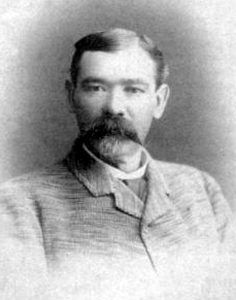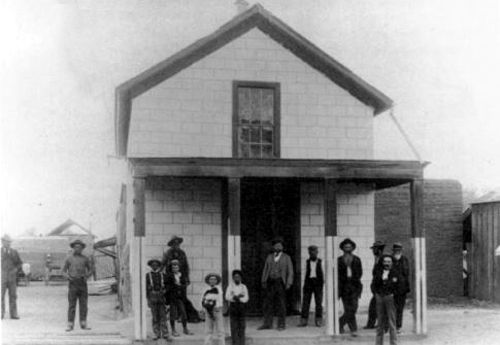John Peter Gabriel was a prominent lawman in Pinal County, Arizona, in the 1880s. Gabriel pursued the Red Jack Gang and numerous other bandits. In 1888, he barely survived the Florence, Arizona Gunfight with Joe Phy.
Gabriel was born on November 17, 1838, in Kruft, Germany, the fourth of six children to John and Anna Schlauss Gabriel. In the spring of 1848, he immigrated with his parents to the United States, where the family settled in Grant County, Wisconsin. A year later, in July of 1849, his father died. When his mother could not support the family, 12-year-old Pete was taken in by a prominent lawyer named Ninian Whiteside, who soon joined the gold rush for California, moving his family and young Gabriel with him. When John grew up, he worked in various professions before eventually making his way to Arizona, where he often worked in mining and, at other times, as a lawman.
In 1877, he was running a hotel at Silver King in Pinal County when Sheriff Peter R. Brady appointed him a resident deputy. Gabriel’s popularity with local Democrats prompted him to run for sheriff against his boss the following year; he defeated Brady at took office in January 1879.
He quickly established himself as one of Arizona’s finest and most-dedicated sheriffs, fighting lynch mobs and tracking down stage robbers, murderers, horse thieves, and cattle rustlers. His skills with a gun were also well known, prompting one observer to say: “Gabriel was the finest pistol shot I have ever known, equaling, I am sure, the best the West ever produced.”
Somewhere along the line, he hired a man named Joseph Phy, an experienced law officer, to become his deputy. The pair, who had previously known each other in a law enforcement capacity, were friends. However, in 1883 he fired Phy for disorderly and drunken conduct and later arrested him in Casa Grande, Arizona, for assault.
Gabriel left the office of sheriff at the end of his term in 1886. He spent much of his time at his mine in the Dripping Springs Mountains, only occasionally coming to town to buy supplies and conduct business. That same year, Phy decided to run for sheriff, and despite their past differences, Gabriel initially supported him for the job. However, he withdrew his support at some point, and the two former friends soon became bitter enemies.
After two years of simmering anger, both men were in Jack Keating’s Tunnel Saloon in Florence, Arizona, on May 3, 1888. Before long, an argument erupted that quickly escalated to the point that Phy went out on the street, calling Gabriel out. Both men went for their guns, and a blazing gunfight occurred. After eleven shots had been fired, Gabriel was wounded in the groin and the chest and staggered to a nearby stable, where he collapsed. Miraculously, he would survive. Phy, however, was not so lucky. Also seriously wounded, he lived but four hours. Gabriel stood trial for the killing but was exonerated on the grounds of self-defense.
Peter Gabriel spent the next decade prospecting in Arizona and northern Mexico before returning to work his old claim – the Monitor Mine on Mineral Creek. At the age of 59, he drank poisonous water, probably laced with arsenic used in mining, and for a week, he lay alone and deathly ill in his cabin. Finally, his mining partner found him there on July 28, 1898. Gabriel died the next day and was buried near the mine.
In reporting his death, the Phoenix Herald said, “He was a bold and fearless man, a good officer… Pete Gabriel probably carried more scars at the hands of the lawless element than any other man in the southwest.”
© Kathy Alexander/Legends of America, updated April 2023.
Also See:
Adventures in the American West
Arizona – The Grand Canyon State
Sources:
Auer, L.C.; Gun Grudge in Florence
Boessenecker, John; Pete Gabriel: Gunfighting Lawman of the Southwestern Frontier; The Journal of Arizona History; Arizona Historical Society, Spring, 2012.
Find a Grave
True West Magazine


